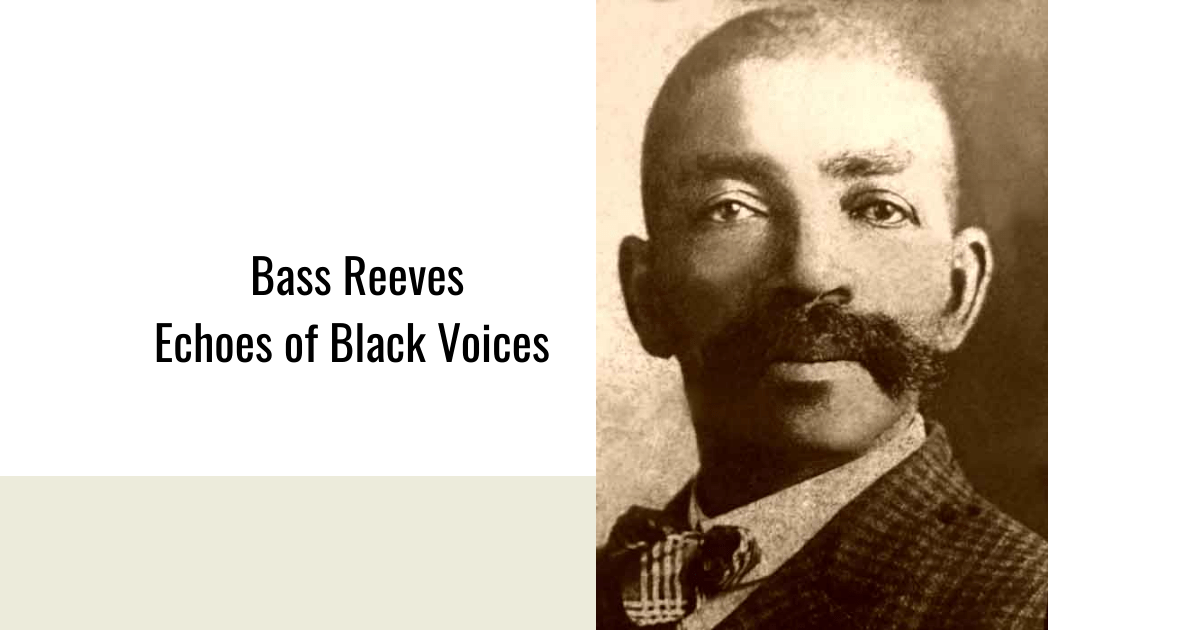Echoes of Black Voices || In honor of Black History Month
Born to slave parents in 1838 in Crawford County, Arkansas, Bass Reeves would become the first black U.S. Deputy Marshal west of the Mississippi River and one of the greatest frontier heroes in our nation’s history.
Owned by a man named William Reeves, a farmer and politician, Bass took the surname of his owner, like other slaves of the time. His first name came from his grandfather, Basse Washington.
Reeves started as a water boy until he was old enough to become a field hand, working alongside his parents. In about 1846, William Reeves moved his operations, family, and slaves to Grayson County in Texas.
During these years of the Civil War, Bass parted company from Reeves; some say because Bass beat up George after a dispute in a card game. Others believe that Bass heard too much about the “freeing of slaves” and ran away. In any event, Bass fled to Indian Territory (Oklahoma), where he took refuge with the Seminole, Cherokee, and Creek Indians, learning their customs, languages, and tracking skills. He also honed his firearm skills, becoming very quick and accurate with a pistol. Though Reeves claimed to be “only fair” with a rifle, he was barred regularly from competitive turkey shoots.
“Freed” by the Emancipation Proclamation in 1863 and no longer a fugitive, Reeves left Indian Territory and bought land near Van Buren, Arkansas, where he became a successful farmer and rancher. A year later, he married Nellie Jennie from Texas and immediately began to have a family. Raising ten children on their homestead — five girls and five boys, the family lived happily on the farm.
Reeve’s life as a contented farmer would change when the Federal Western District Court was moved to Fort Smith, Arkansas, and Isaac C. Parker was appointed on May 10, 1875. At that time, the Indian Territory had become exceptionally lawless as thieves, murderers, and anyone wishing to hide from the law took refuge in the territory that previously had no federal or state jurisdiction.
One of Parker’s first official acts was to appoint U.S. Marshal James F. Fagan as head of some 200 deputies he was then told to hire. Fagan heard of Bass Reeves’ significant knowledge of the area, as well as his ability to speak several tribal languages, and soon recruited him as a U.S. Deputy.
A high point of Reeves’ career was apprehending a notorious outlaw named Bob Dozier. Dozier was known as a jack-of-all-trades when it came to committing crimes, as they covered a wide range from cattle and horse rustling to holding up banks, stores, and stagecoaches; to murder and land swindles. Because Dozier was unpredictable, he was also hard to catch, and though many lawmen had tried to apprehend him, none were successful until it came to Reeves. Dozier eluded Reeves for several months until the lawman tracked him down in the Cherokee Nation. After refusing to surrender, Reeves killed Dozier in an accompanying gunfight on Dec. 20, 1878.
In 1887, Reeves was charged with murdering a posse cook. Like the many outlaws he had arrested, he was tried before Judge Isaac Parker. He was represented by United States Attorney W.H.H. Clayton, a colleague, and friend. In the end, Reeves was acquitted.
In 1889, after Reeves was assigned to Paris, Texas, he went after the Tom Story gang of horse thieves. He waited along the route that the gang was known to have used and surprised Tom Story with an arrest warrant. The outlaw panicked and drew his gun, but Reeves drew faster and killed him. The rest of the gang disbanded and were never heard from again.
Over the 35 years that Bass Reeves served as a Deputy United States Marshal, he earned his place in history by being one of the most effective lawmen in Indian Territory, bringing in more than 3,000 outlaws and helping to tame the lawless territory. Killing some 14 men during his service, Reeves always said that he “never shot a man when it was not necessary for him to do so in the discharge of his duty to save his own life.” Reeves died on Jan. 12, 1910, from Bright’s Disease.
“Maybe the law ain’t perfect, but it’s the only one we got, and without it, we got nuthin.”
— Bass Reeves.




